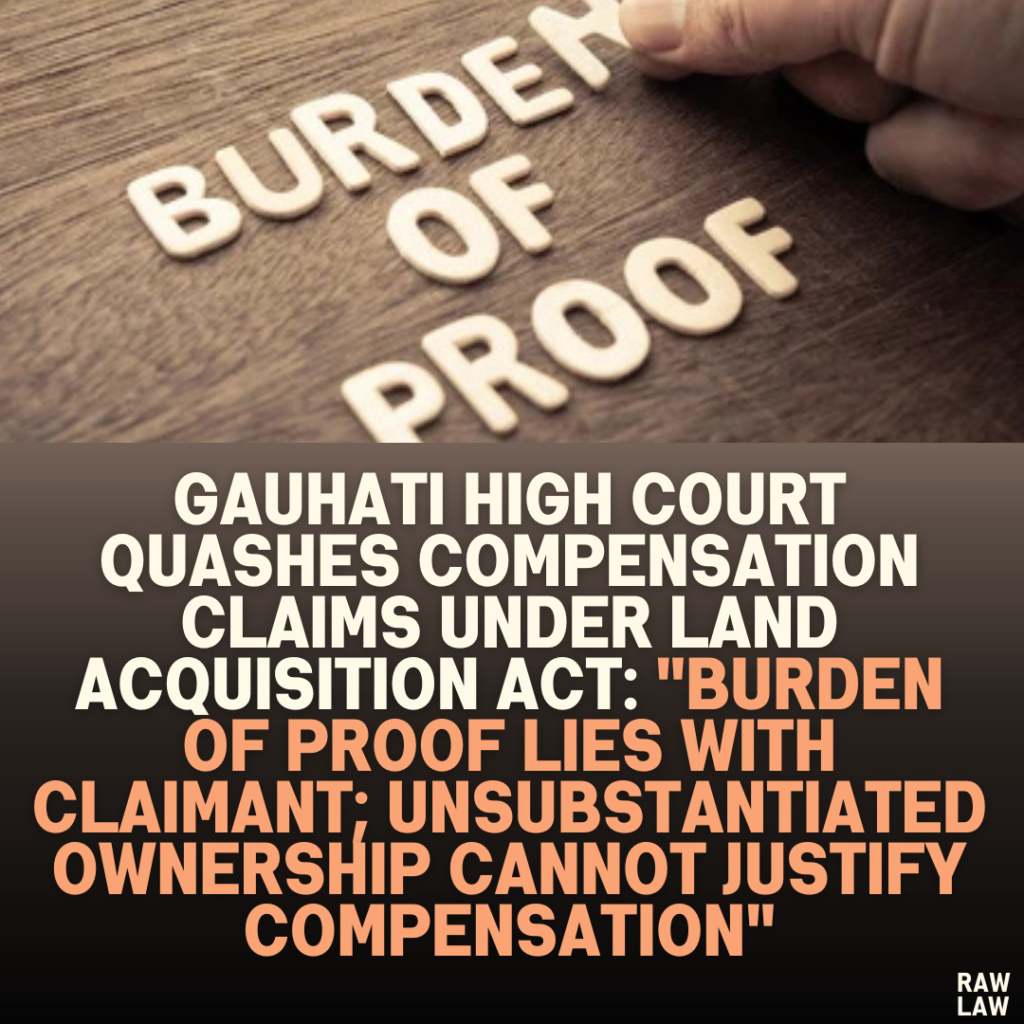Court’s Decision
The Gauhati High Court set aside the Single Judge’s order directing compensation to the respondents for the acquisition of land allegedly owned by their predecessor-in-interest, Late Saroj Kumari Choudhury. The court concluded that the appellants, represented by the State of Assam, established through substantial documentary evidence that the disputed land belonged to other parties and not the respondents’ predecessor. However, the court acknowledged that compensation for the respondents’ share of land under Dag No. 3663 was already deposited in a revenue account and permitted the respondents to claim it in accordance with the law.
Facts
- The respondents filed a writ petition claiming compensation for land their predecessor-in-interest, Late Saroj Kumari Choudhury, allegedly owned and which they argued was acquired by the State for constructing the Raj Bhawan in Guwahati in 1975.
- The Single Judge’s order dated July 11, 2018, directed the State to initiate compensation proceedings within three months.
- Subsequently, the appellants conducted a detailed inquiry, disputing the respondents’ claims and filing a review petition. The review petition was dismissed on the grounds that the evidence brought forward was discovered after the Single Judge’s decision and could not form a valid basis for a review.
- The appellants filed this appeal challenging the Single Judge’s order and the dismissal of their review petition.
Issues
- Was the land claimed by the respondents’ predecessor-in-interest acquired or requisitioned by the State for constructing the Raj Bhawan?
- Did the respondents establish their ownership of the land to justify compensation?
- Were the respondents entitled to compensation under the circumstances?
Petitioner’s Arguments
The appellants (State of Assam) presented the following arguments:
- Dag No. 121:
- Revenue records demonstrated that the land under Dag No. 121 had been mutated in the name of Prafulla Ch. Baruah as early as 1962, with corrections made in 1963.
- The appellants submitted a certified copy of the Sadar Jamabandi from 2019, further confirming Baruah’s ownership.
- Late Saroj Kumari Choudhury, therefore, had no claim over this land.
- Dag No. 122:
- The land under Dag No. 122, measuring 15 Bighas 0 Katha 6 Lechas, was owned by the Indian Tobacco Co. Ltd.
- A portion of this land (3 Bighas 4 Kathas 15 Lechas) was acquired, and compensation was paid to Indian Tobacco Co. Ltd. in 1979. Another portion (11 Bighas 0 Katha 11 Lechas) was requisitioned for Raj Bhawan construction.
- The respondents’ predecessor did not own any part of this land.
- Dag No. 3663:
- This land, measuring 2 Bighas 2 Kathas 9 Lechas, was jointly owned by three individuals, including Late Saroj Kumari Choudhury.
- Compensation for this land was assessed at ₹4,24,296, and while one co-owner, Smti. Nirmala Medhi, had collected her share in 2002, the shares of Late Saroj Kumari Choudhury and another co-owner were deposited in a revenue account.
- The Single Judge’s order was passed without the benefit of these findings, and the review petition was erroneously dismissed.
Respondent’s Arguments
The respondents argued:
- Their predecessor’s name was recorded as the owner of the land in revenue records for 40 Bighas 7 Lechas across Dag Nos. 121, 122, and 3663.
- Earlier affidavits filed by the State supported their claim.
- The appellants’ inquiry and subsequent evidence were conducted after the Single Judge’s decision and could not be entertained in a review petition.
Analysis of the Law
- Burden of Proof:
- The court noted that in land acquisition disputes, the burden to establish ownership lies with the claimant. The respondents failed to counter the detailed documentary evidence presented by the appellants.
- Relevance of Revenue Records:
- Revenue records, including mutation orders, Jamabandis, and acquisition documents, conclusively demonstrated ownership of the disputed land by third parties like Prafulla Ch. Baruah and Indian Tobacco Co. Ltd., not the respondents’ predecessor.
- Acquisition Procedures:
- The court emphasized the importance of following proper acquisition procedures, including verifying ownership before compensation is awarded. In this case, the appellants had demonstrated compliance through documentary evidence.
- Applicability of Review:
- The review petition was correctly dismissed since the appellants’ evidence was discovered post facto. However, this evidence was admissible in the current appellate proceedings.
Precedent Analysis
The court referred to established principles that compensation claims require clear and undisputed evidence of ownership. Without substantiating their claims, parties cannot benefit from compensation awards.
Court’s Reasoning
- The appellants proved through official records that the land under Dag Nos. 121 and 122 was owned by third parties, not Late Saroj Kumari Choudhury.
- For Dag No. 3663, the respondents’ predecessor owned a share, but compensation was already deposited in a revenue account.
- The respondents failed to provide counter-evidence to dispute the appellants’ findings.
- The Single Judge’s order granting compensation was unsustainable as it lacked a factual basis.
Conclusion
The court quashed the Single Judge’s order, holding that:
- The land under Dag Nos. 121 and 122 was not owned by the respondents’ predecessor, and compensation for it was unwarranted.
- The respondents could claim the deposited compensation for Dag No. 3663, as per law.
- The appeal was allowed, and the writ petition was dismissed.
Implications
- Clarity in Land Acquisition:
- This judgment reinforces the importance of accurate land records and conclusive evidence in determining compensation claims.
- Safeguards Against Erroneous Compensation:
- The decision prevents unwarranted financial liabilities on the State and ensures that only rightful claimants are compensated.
- Future Guidance:
- Sets a precedent for courts to scrutinize evidence thoroughly in land-related disputes, particularly involving government acquisitions.




Pingback: Orissa High Court: "Land Ownership and Possession Dispute Remitted for Fresh Disposal" – Appellate Court's Failure to Address Core Issues of Title, Limitation, and Maintainability Before Remitting on Grounds of Non-Joinder Deemed a Futile